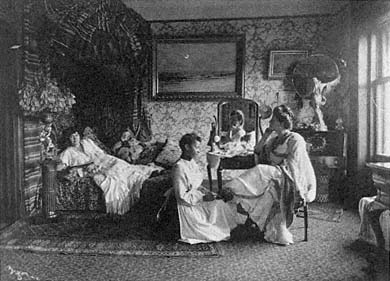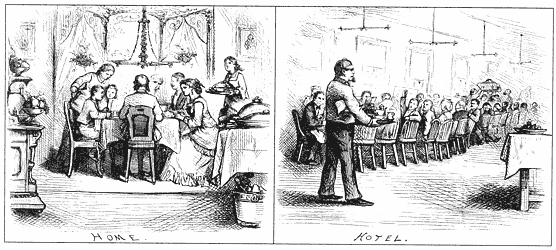Undermined Domestic Roles and Rituals
Women who lived in hotels—particularly those residents of palace and midpriced hotels who could afford the alternative of a single-family house—ran the risk of becoming spoiled by caravansary comforts. They also inevitably violated the Victorian requirements of true womanhood—being a proper mother and an active homemaker.[17] In 1857, the editors of Harper's Weekly declared that hotel women were "rapidly becoming unfit not only to be mothers, but to be wives, and members of society at all" (fig. 7.3). They could "neither work, nor talk, nor cook, nor make a bed." Worse yet, they spent "their whole life in gossiping with people of both sexes who are as idle as themselves."[18] Early critics also warned that the inappropriately lavish habits and empty materialism learned in expensive hotels would follow young couples into their mature years.[19] In 1905, Edith Wharton saw the fulfillment of such prophecies. She characterized fashionable New York hotel women as socially objectionable:
Figure 7.3
This reposing room in a Turkish bath, about 1904, typified the self-indulgence
and empty lives that hotels made too easy for women of wealth.
[They were] . . . wan beings as richly upholstered as the furniture, beings without definite pursuits or permanent relations, who drifted on a languid tide of curiosity from restaurant to concert hall, from palm-garden to music room, from "art exhibit" to dressmaker's opening.[20]
It was all, Wharton said, a "vast, gilded void of existence." Other commentators found midpriced hotels less gilded but still empty. In 1923, hotel maids told Hayner that life at a midpriced hotel "made bums out of women." Their days consisted of sleeping until noon, shopping, playing bridge, taking beauty naps, dressing for dinner, and going out in the evening. One maid called the late-sleeping women "sundodgers."[21]
Interior decorating—assembling the middle-income family's material individuality—relied particularly on the mother. Critics wrote that a hotel mother could not "create that atmosphere of manners and things around her own personality, which is the chief source of her effectiveness" and her power over her husband and the development of her children.[22] Data in the 1920 census alarmed Bertha Nienburg, who wrote that Rochester, New York, had 11,500 married women (out of 74,000 total) who were eating at restaurants or living with relatives and thus not keeping house. These women, said Nienburg, may have been "succeeding in their function as guardians of the family," but they were
"not contributing to the permanence and stability of civic life through the maintenance of homes."[23] An unhappy woman who had lived in a hotel concluded that "the only endurable kind" of day to have while living in a hotel was a "day busy elsewhere."[24]
Ironically, "being busy elsewhere" was exactly why hotel life appealed to many women of the middle and upper class. Part of the hotel's threat to the true cult of womanhood was that it freed women with nontraditional lives—those who had paid vocations (as doctors, teachers, or secretaries) or active volunteer careers (with charities or other organizations)—from the roles of decorating, entertaining, and doing little favors for their families. Inasmuch as such women threatened the dominant culture, their hotel homes were a threat as well.
Also prominent in the sins of hotel life was its reputation for breaking the ritual and privacy of the family dinner table. William Dean Howells said that for the proper family, private dining was the "moral effect of housekeeping." At the table, or in the parlor after meals, the ideal family was supposed to linger for conversation, companionship, and reading or embark on spontaneous family excursions. Public dining flaunted the model family meal supervised by the mother, presided over by the father, and attended by children at their accustomed chairs receiving instruction (figs. 7.4, 7.5).[25] To the 1903 editors of Architectural Record , communal dining was "the consummate flower of domestic irresponsibility, . . . the sacrifice of everything implied by the word 'home.'"[26] In restaurants or in boardinghouses, regular seats could not be assigned, and parents could not discipline their children without feeling public scorn. Families did not even have to eat at the same time. If they did eat together, they often scattered after the meal: father to the lobby to talk with men about business or politics, mother to a bridge party, daughter to a dance, and son to the billiard room. Hotels presented almost no friction of distance to retard this family dispersal, while suburban settings imposed a great deal of such friction. Burgess put it in the terms of an urban sociologist: the "small family group in apartment houses and residential hotels" was "the most notorious illustration of effectual detachment from the claims of kinship."[27] The lack of control in the dining room extended to the rest of the hotel home. In common halls or public lobbies, strangers and chance acquaintances had ready access to children. Mothers could not strictly control what their children saw in daily life.[28]
Figure 7.4 and 7.5
Two of a series of 1871 Harper's Weekly cartoons by Thomas Nast comparing hotel and home life.
Left , the tranquil and protected family dining room; right , a rough and noisy dining room in a
mid-priced hotel of that period.
Also threatening the mainstream role of wives was the fact that hotels made possible a cultured, civilized life for men without the aid of a woman. To be sure, cheap lodging houses did little to substitute for women's care. So, too, the stereotypical homeless or single man was a nasty, gruff brute who proved how much men needed the civilizing influence of a home with a woman to take care of him (fig. 7.6). However, hotels in the better price ranges could provide domestic care as well as, or better than, a woman could. In some cases, then, the maxim "what every man needs is a good woman," became "what every man needs is a good hotel ."[29] Hotel life not only threatened to spoil men and women for predetermined roles but also threatened to erase the roles themselves.

